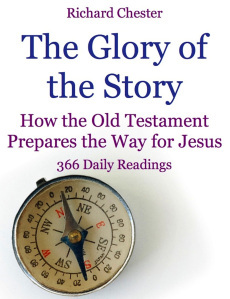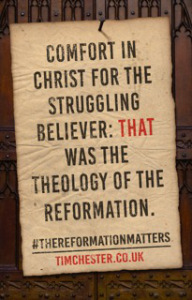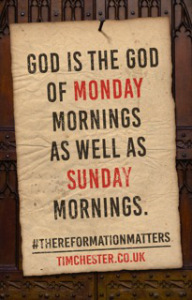Tim Chester's Blog, page 24
August 14, 2016
The Image of God #1: We are defined in relation to reality
In April I delivered a talk on the image of God to the Acts 29 Europe conference in Rome. Each week for the next five weeks I’m going to post an extended and expanded version of that talk. In the first part we see that we are defined in relation to reality – a claim that would have been seen as obvious to most generations except, as we shall see, our own.
Many years ago I worked in the second-hand department of a large bookshop in Oxford. Every time my colleagues bought a book they would pencil in the amount they’d paid for it in a code based on the phrase ‘know thyself’. K=1, N=2 and so on. So a book with ‘KN’ pencilled in the back had been bought for £12.
The phrase ‘know thyself’ goes back in the lost past of Western philosophy. It’s been used in different ways over the centuries, but common to them all is the idea of having an objective perspective on yourself. It’s been often used to ridicule the proud whose self-perception has lost touch with reality.
I want to suggest that we live in an age that, in its pride, is losing touch with reality.
What ‘know thyself’ encapsulates is the belief throughout the ages – Christian and non-Christian – that wisdom is to understand yourself in relation to reality outside of yourself. There are many variations on what people think that reality is. But the common assumption is that we live well when we confirm to reality – when our expectations are realistic, when our responses are appropriate, when our desires are evaluated.
In Christian theology this finds expression, for example, in John Calvin’s famous dictum: ‘Without knowledge of God there is no knowledge of self.’ In other words, to ‘know thyself’ you need to understand that you’re made in the image of God, defined by the reality of God.
In Genesis 1 God says, ‘Let us make mankind in our image, in our likeness.’ How is it then that we are like God? After all, we’re not spirits; we’re not omnipotent. The clue is in the plural pronoun: ‘Let us’. We’re made in the image of the relational, trinitarian God. Our identity is found in relationships:
to God (‘God created mankind in his own image’)
to other people (‘male and female he created them’)
to creation (‘so that they may rule over … all the creatures’)
So Tim Chester is the husband of Helen, the father of Katie and Hannah, a member of Grace Church, Boroughbridge, and a child of God. That matrix of relationships makes me unique. It’s true of nobody else. But it’s an identity that ties me to others. I don’t ‘find’ myself if I leave my wife for a new lover. I lose myself. I become less human.
Our gender is a sign of this. ‘Male and female he created them.’ In other words, each of us is born with sexual organs that show we’re made for self-giving union with another, to be completed by another. It’s encoded in our physical bodies. And this is a sign that we’re made for self-giving union with God. Marriage is a sign of this and contented singleness testifies to the reality beyond the sign. So at stake in the complementarity of the sexes is nothing less than the meaning of life. At stake in right sexual conduct is the revelation of our true goal, union with God. Christopher West says, ‘God gave us sexual desire … as the fuel of a rocket that is meant to launch us into the stars and beyond.’
So I’m defined by realities outside of myself, especially my relationship to God. To be human is to be in the image of God, defined by God.
John Calvin, Institutes, 1.1.2.
Christopher West, Theology of the Body for Beginners: A Basic Introduction to Pope John Paul II’s Sexual Revolution, West Chester, PA: Ascension Press, Rev. Ed., 2009, Kindle Location 1001.
SPONSORS
Support this site by using these links:
amazon.co.uk :: amazon.com
includes Tim Chester’s books


August 11, 2016
You are not given grace for tomorrow, for ifs and maybes—you are given grace for today. #ExodusForYou
You are not given grace for tomorrow, for ifs and maybes—you are given grace for today.
This quote is from my latest book, Exodus for You. Exodus for You is available here from amazon.com and amazon.co.uk as well as thegoodbook.com, thegoodbook.co.uk and thegoodbook.com.au.
SPONSORS
Support this site by using these links:
amazon.co.uk amazon.com
includes Tim Chester’s books


August 3, 2016
Why the Reformation Quote #10
August 1, 2016
The Glory of the Story Sample: Day 112 – Jacob the prototype of Israel
Reading: Hosea 11:12-12:6
 Here is another extracts from
The Glory of the Story
, my father’s devotional introduction to biblical theology in the form of 366 daily readings which show how the Old Testament story is fulfilled in Christ.
The Glory of the Story
is available as a Kindle book for $2.99 from amazon.com and £1.99 from amazon.co.uk. I’m posting extracts from the chaper on the story of Jacob, usually on the first Monday of the month.
Here is another extracts from
The Glory of the Story
, my father’s devotional introduction to biblical theology in the form of 366 daily readings which show how the Old Testament story is fulfilled in Christ.
The Glory of the Story
is available as a Kindle book for $2.99 from amazon.com and £1.99 from amazon.co.uk. I’m posting extracts from the chaper on the story of Jacob, usually on the first Monday of the month.
In today’s passage God rebukes both Israel (also called Ephraim) and Judah for pretending loyalty to him while living deep in deceit and idolatry. In seeking national prosperity while disregarding him, they are striving for the unattainable; pursuing the wind (1; cf. Eccles. 2:11). This is seen in their deceitful foreign policy. Instead of depending on God they are receiving help from Assyria, while at the same time trying to buy the support of Assyria’s enemy, Egypt (1). So Hosea reminds them of their roots in three incidents from the life of Jacob (3-4) – not in chronological order:
(i) At birth Jacob grasped his brother’s heel, an action which turned out to be prophetic of his attitude to life. So he was chosen despite weakness of character.
(ii) At Peniel Jacob humbled himself, begged for God’s favour and was renamed Israel.
(iii) At Bethel Jacob was overwhelmed by God’s grace. As a runaway from Esau (and God), God ‘found him … and talked with him there’.
Hosea is showing that Jacob the man is a kind of prototype of Israel the nation. Like Jacob, they have nothing to commend themselves (cf. Deut. 32:9-12). Israel was born when Jacob finally abandoned his own agenda (deliverance from Esau) and his own resources, and clung in desperation to God. Peniel was where they received the name ‘Israel’ and the eating custom associated with it (Gen. 32:32). No Israelite was intended to forget his roots. Israel’s tragedy, however, was that she always inclined to be Jacob and use God for her own ends.
This is the paradox at the heart of the nation’s life. They are both Jacob and Israel, and God is both their Saviour striving to bless them and their enemy fighting against them (Is.63: 9-10). Jacob has passed his unsavoury characteristics to his descendants. But if they turn from their Jacob-like duplicity and self-sufficiency, God will deliver them as he did Jacob (6). He is still the God of Bethel, the God of power and graciousness and the LORD is his name of renown (5), his covenant name (Exod. 3:14). And because God does not change, the descendants of Jacob are not destroyed (Mal. 3:6).
Closing thought
The continuing use of the name Jacob as well as Israel throughout the OT can be compared to that of Simon in the NT (compare John1:42 with Luke 22:31). What can we as Christians learn from this?
SPONSORS
Support this site by using these links:

includes Tim Chester’s books


July 31, 2016
When does sin disqualify someone from leadership?
No church leader is perfect. So all church leaders sin. So when does sin disqualify someone from leadership?
I suggest two things need to be borne in mind.
First, the attitude of the leader (or potential leader) to their sin. The key thing is a person responds with faith and repentance. This is more important than some notional scale of sin. Do they repent of their sin? Do they believe the gospel promise’s of forgiveness, justification and reconciliation? If, for example, they don’t believe themselves justified in God’s sight then they are likely to become hesitant in their preaching and pastoral work for fear of their own exposure.
The problem (from a pastoral perspective) is that faith and repentance are not binary for Christians. It’s not that we either have faith or we don’t have faith. ‘Lord, I believe; help my unbelief,’ is our constant cry. There is every possibility that a person can be believing and repentant, and at the same time unbelieving and unrepentant – or at least moving between those two states. So there is a need for wisdom.
It is possible for a person to respond to exposed sin with faith and repentance in a ‘textbook’ way. That could be a good sign. But it could also be a bad sign! They could be doing what they needs to do or ought to do to be regain their position in the community. They could even be responding to their sin in the ‘right’ way with motives that are self-righteous. Even confession can be a form of self-righteousness! So it is sometimes helpful to move the language away from forensic categories to affective categories (or at least to ensure the latter are included). So the issue is not just what they do or even what they believe. The issue is also what they love. Without this affective dimension mere assent might be confused with faith. As Jesus asks Peter, ‘Do you love me more than these?’
Second, it is important to distinguish between the seriousness of a particular sin from a divine and human perspective.
From a divine perspective what counts is not the gravity of the sin (as measured by human beings). Matthew 5 tells us that lust in the heart is equivalent in God’s sight to adultery. (Indeed sometimes the only difference between the person who lusts and the person who commits adultery is cowardice.) What counts before God is faith and repentance. Indeed a lack of faith is God’s definition of sin.
From a human perspective some sins are worse than others in the sense of the impact they have on others. With Matthew 5 in mind, I would rather some hated me in their heart than murdered me! So, while in terms of justification and sanctification we should treat all sins alike, in some situations we can and should take into account the gravity of sin measured in its impact on others. This is particularly the case when assessing leaders. 1 Timothy 3 says an elder should be an example to believers and of good reputation with unbelievers.
1 Timothy 5:20 suggests that leaders need a public process of reproof (and, by extension, repentance). Clearly this cannot mean every sin must be publicly disowned. I think it refers to sins that, if they came to light, would confuse the flock and harm the church’s wider reputation. Consider an elder who commits an act of sexual immorality of which he is then repentant. Let’s suppose this is hushed up and he is quietly stood down for a time before being re-instated. What happens if this comes to wider attention at some point in the future? Christians in the congregation are confused and unbelievers have their prejudices confirmed. But if his repentance is public then the message of the gospel is affirmed and illustrated to all. Plus there is no fear of future exposure.
SPONSORS
Support this site by using these links:

includes Tim Chester’s books


July 28, 2016
At the cross, the Maker was unmade so that we can be remade. #ExodusForYou
At the cross, the Maker was unmade so that we can be remade.
This quote is from my latest book, Exodus for You. Exodus for You is available here from amazon.com and amazon.co.uk as well as thegoodbook.com, thegoodbook.co.uk and thegoodbook.com.au.
SPONSORS
Support this site by using these links:
amazon.co.uk amazon.com
includes Tim Chester’s books


July 24, 2016
O Lord our Rock – video
This is a song for which I wrote the lyrics and my friend Rob Spink wrote the music. It’s for ‘The House Band’ album which you can listen to and buy here.


July 20, 2016
Why the Reformation Quote #9
July 17, 2016
A Gospel-Centred Approach to Busyness
Here’s a talk I gave at the European Leadership Forum last year on ‘A Gospel-Centred Approach to Busyness’:
[youtube http://www.youtube.com/watch?v=EiMKB6...]
This material is adapted from The Busy Christians Guide to Busyness which is available here from amazon.com and amazon.co.uk.
SPONSORS
Support this site by using these links:

includes Tim Chester’s books


July 14, 2016
God uses suffering to make us cling to him, clarify our identity and increase our longing. #ExodusForYou
God uses suffering to make us cling to him, clarify our identity and increase our longing.
This quote is from my latest book, Exodus for You. Exodus for You is available here from amazon.com and amazon.co.uk as well as thegoodbook.com, thegoodbook.co.uk and thegoodbook.com.au.
SPONSORS
Support this site by using these links:
amazon.co.uk amazon.com
includes Tim Chester’s books


Tim Chester's Blog
- Tim Chester's profile
- 183 followers









